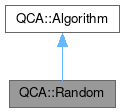QCA::Random
#include <QtCrypto>

Public Member Functions | |
| Random (const QString &provider=QString()) | |
| Random (const Random &from) | |
| uchar | nextByte () |
| SecureArray | nextBytes (int size) |
| Random & | operator= (const Random &from) |
 Public Member Functions inherited from QCA::Algorithm Public Member Functions inherited from QCA::Algorithm | |
| Algorithm (const Algorithm &from) | |
| void | change (const QString &type, const QString &provider) |
| void | change (Provider::Context *c) |
| Provider::Context * | context () |
| const Provider::Context * | context () const |
| Algorithm & | operator= (const Algorithm &from) |
| Provider * | provider () const |
| Provider::Context * | takeContext () |
| QString | type () const |
Static Public Member Functions | |
| static SecureArray | randomArray (int size) |
| static uchar | randomChar () |
| static int | randomInt () |
Additional Inherited Members | |
 Protected Member Functions inherited from QCA::Algorithm Protected Member Functions inherited from QCA::Algorithm | |
| Algorithm () | |
| Algorithm (const QString &type, const QString &provider) | |
Detailed Description
Source of random numbers.
QCA provides a built in source of random numbers, which can be accessed through this class. You can also use an alternative random number source, by implementing another provider.
The normal use of this class is expected to be through the static members - randomChar(), randomInt() and randomArray().
- Examples
- randomtest.cpp.
Definition at line 65 of file qca_basic.h.
Constructor & Destructor Documentation
◆ Random() [1/2]
Standard Constructor.
- Parameters
-
provider the name of the provider library for the random number generation
◆ Random() [2/2]
| QCA::Random::Random | ( | const Random & | from | ) |
Copy constructor.
- Parameters
-
from the Random object to copy from
Member Function Documentation
◆ nextByte()
| uchar QCA::Random::nextByte | ( | ) |
Provide a random byte.
This method isn't normally required - you should use the static randomChar() method instead.
- See also
- randomChar
- Examples
- randomtest.cpp.
◆ nextBytes()
| SecureArray QCA::Random::nextBytes | ( | int | size | ) |
Provide a specified number of random bytes.
This method isn't normally required - you should use the static randomArray() method instead.
- Parameters
-
size the number of bytes to provide
- See also
- randomArray
- Examples
- randomtest.cpp.
◆ operator=()
Assignment operator.
- Parameters
-
from the Random object to copy state from
◆ randomArray()
|
static |
Provide a specified number of random bytes.
- Parameters
-
size the number of bytes to provide
- Examples
- randomtest.cpp.
◆ randomChar()
|
static |
Provide a random character (byte)
This is the normal way of obtaining a single random char (i.e. 8 bit byte), as shown below:
If you need a number of bytes, perhaps randomArray() may be of use.
- Examples
- randomtest.cpp.
◆ randomInt()
|
static |
Provide a random integer.
This is the normal way of obtaining a single random integer, as shown below:
- Examples
- randomtest.cpp.
The documentation for this class was generated from the following file:
Documentation copyright © 1996-2025 The KDE developers.
Generated on Fri May 2 2025 12:01:48 by doxygen 1.13.2 written by Dimitri van Heesch, © 1997-2006
KDE's Doxygen guidelines are available online.